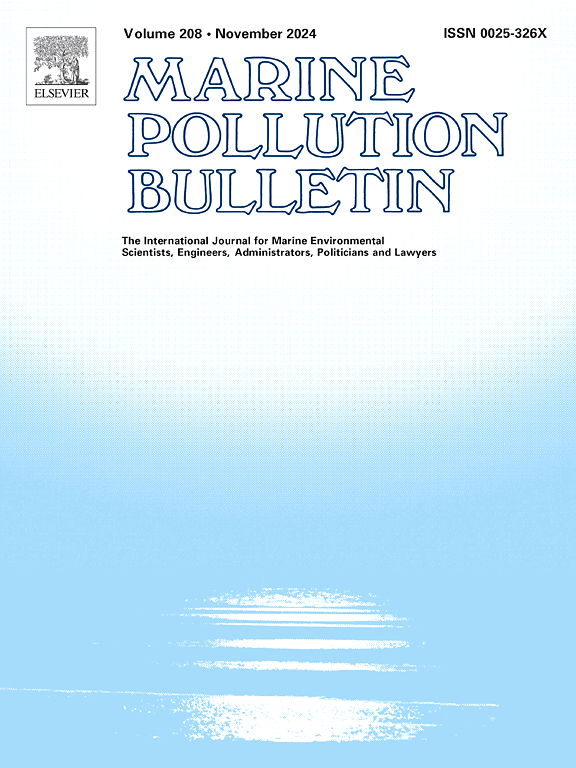Quantifying vessel noise and acoustic habitat loss in marine soundscapes
IF 4.9
3区 环境科学与生态学
Q1 ENVIRONMENTAL SCIENCES
引用次数: 0
Abstract
Quantifying underwater vessel noise in marine ecosystems is challenging, due to difficulties in accounting for small, not publicly tracked boats, creating a knowledge gap in marine management. We present a computationally efficient framework that detects all vessel noise in hydrophone recordings and quantifies associated excess noise levels as well as acoustic habitat loss, offering a cost-effective and replicable tool for assessing vessel noise effects on marine soundscapes. Applied to one year of acoustic data from five sites along the coast of British Columbia (BC), Canada, the detector achieved 96.4 % accuracy and was robust against varying levels of vessel traffic and weather conditions. Across sites, vessel noise impacts increased with proximity to urban centers. Following this trend, average annual vessel noise presence ranged between 24 % and 85 %, increasing the 500 Hz decidecade band by 1.0 dB to 6.4 dB across sites. The average year-round acoustic habitat loss for killer whales, expressed as the reduction of listening space in a 0.5–15 kHz communication band, ranged from 6.6 % to 46.9 %. Vessel noise impacts were generally higher during daylight hours and in the summer months. The results are the first comprehensive, empirical assessment of vessel presence and associated noise impacts for a regional ecosystem in BC.

海洋声景中船舶噪声和声生境损失的量化
量化海洋生态系统中水下船只的噪音是一项挑战,因为很难对小型、非公开跟踪的船只进行统计,这在海洋管理方面造成了知识空白。我们提出了一个计算效率高的框架,可以检测水听器记录中的所有船舶噪声,并量化相关的过量噪声水平以及声栖息地的丧失,为评估船舶噪声对海洋声景的影响提供了一个具有成本效益和可复制的工具。应用于加拿大不列颠哥伦比亚省(BC)沿岸五个地点一年的声学数据,该探测器的准确率达到96.4%,并且对不同水平的船舶交通和天气条件具有很强的鲁棒性。在各个站点,船舶噪音影响随着靠近城市中心而增加。按照这一趋势,船舶的年平均噪音存在率在24%至85%之间,使各站点的500 Hz十年间频带增加了1.0 dB至6.4 dB。虎鲸全年的平均听觉栖息地损失,以0.5-15 kHz通信频段的听力空间减少来表示,范围从6.6%到46.9%。船只噪音对本港的影响,一般在白天及夏季较严重。研究结果是首次对不列颠哥伦比亚省区域生态系统的船舶存在和相关噪音影响进行全面的实证评估。
本文章由计算机程序翻译,如有差异,请以英文原文为准。
求助全文
约1分钟内获得全文
求助全文
来源期刊

Marine pollution bulletin
环境科学-海洋与淡水生物学
CiteScore
10.20
自引率
15.50%
发文量
1077
审稿时长
68 days
期刊介绍:
Marine Pollution Bulletin is concerned with the rational use of maritime and marine resources in estuaries, the seas and oceans, as well as with documenting marine pollution and introducing new forms of measurement and analysis. A wide range of topics are discussed as news, comment, reviews and research reports, not only on effluent disposal and pollution control, but also on the management, economic aspects and protection of the marine environment in general.
 求助内容:
求助内容: 应助结果提醒方式:
应助结果提醒方式:


